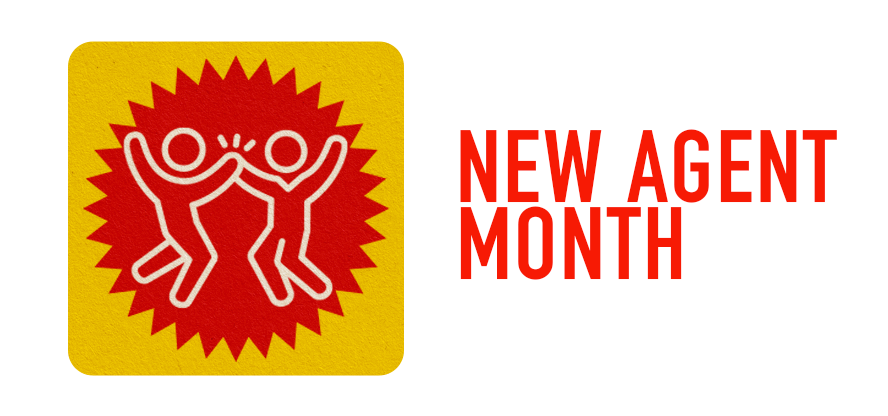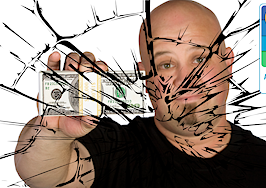 February is New Agent Month at Inman. Follow along as we go deeper on the tools, tech and tips you’ll need to survive and thrive in 2024. For curated content crafted just for first-year agents, be sure to subscribe to our weekly newsletter, The Basics.
February is New Agent Month at Inman. Follow along as we go deeper on the tools, tech and tips you’ll need to survive and thrive in 2024. For curated content crafted just for first-year agents, be sure to subscribe to our weekly newsletter, The Basics.
Are you ready to break up with your credit card debt, discover how to easily raise your credit your credit score, and put your credit cards to work for you? If so, TikTok’s undisputed expert on how to improve your credit, with over 450,000 followers, is Alisa Glutz, who is also a mortgage banker and the best-selling author of Color My Credit. Glutz has the answers you need to improve your money and credit resumes.
Americans have a credit card debt problem, crossing the $1 trillion mark for the first time in November 2023. The reason? Most people have a love-hate relationship with their credit cards. We love the ease of purchasing and the various perks many credit cards offer, but due to high interest rates, we often find ourselves struggling to reduce our balances.
Unfortunately, most people have no idea about how our credit scores are calculated. To illustrate this point, I was shocked during the Great Recession when I had made every one of my payments on time and even paid off several cards, and my credit score dropped 100 points.
In a recent interview, Glutz helped me understand what happened to me as well as millions of other Americans.
2 approaches for eliminating credit card debt
Glutz explained how the two most well-known strategies for paying off credit card debt works.
Suze Orman’s technique, called the “debt avalanche” approach, starts by identifying which of your credit cards have the highest interest rate. Your goal is to pay down that one card as quickly as possible while making minimum payments on your other cards. The challenge with this approach is that if the balance on that card is high, it can be difficult to sustain.
Dave Ramsey created what is known as the “debt snowball” method. The debt snowball method works by paying off the smaller balances first. According to Glutz, paying off the smaller debts gives you momentum and is often easier to maintain.
Regardless of which strategy you choose, when you pay off the first card, take the amount of that payment and add it to the payment you’re making on the second card. When you pay off the second card, apply to payment from credit cards one and two to the payments you’re making on the third credit card.
The 2 most important types of accounts on your credit report
To understand what makes your credit score go up or down, you must first understand the distinction between “revolving credit,” i.e., your credit card debt where your monthly payments constantly vary based upon the amount of credit you have used, versus an “installment loan” where you purchased a car, a house or some other large item, received a large chunk of money to pay for that purchase, and contractually agreed to make regular payments for a specific amount of time that would pay the debt off in full.
Based upon Glutz’s experience, the place where people are most likely to experience problems is how they’re handling their revolving credit. Most people think they’re good if they make the required minimum payment on time.
“Where people get into trouble is that they never see those balances shrink. In the meantime, even if they’ve never been late, maxing out the credit cards then drops your credit score making credit more expensive,” Glutz said.
“That’s what creates this whole domino effect where, before you know it, you’re paying more for your home and car insurance, you’re paying a higher interest rate for a car, all because you’re carrying higher balances on credit cards.”
Stop renting your debt
There are two things that make paying off credit card debt especially challenging. First, your payment pays all the interest due on the entire loan balance before any money is allocated to paying down the principal. Second, the credit card companies charge you compound interest daily, which doubles your loan balance approximately every three years.
“Daily compound interest” means that the credit card company is charging you the interest on the amount you owe plus the accumulated interest daily. The result is the amount you owe increases daily, even if you make no additional charges.
Based upon her research, Glutz found that 24 percent interest is pretty much equivalent to what the minimum payments are that most credit cards require. So technically, if you’re making minimum payments, you’re not going to ever pay off the debt you owe. Instead, you will be “renting your debt” every month.
When Glutz’s mother had eight credit cards with a total balance of about $25,000, she was making payments of $1,200 total a month, but her balances weren’t decreasing.
Two of her options were to either take out a Home Equity Line of Credit (HELOC) or borrow from her 401K. The difference is that a HELOC and a loan from your 401K are usually at simple interest as opposed to compound interest.
In Glutz’s mother’s case, if she took out a HELOC of $25,000 at 8 percent, her monthly payments would be $505.91 to pay off the loan in five years. In other words, Glutz’s mother’ was paying almost $700 per month to “rent her debt.” (My conclusion)
Other resources for paying off your debt
Additional sources for paying off your debt depend on the amount and the type of debt (credit card, student loan, medical, tax, etc.). Six companies that offer assistance include Accredited Debt Relief, National Debt Relief, Consolidated Credit, American Credit Card Solutions, New Era Debt Solutions and CuraDebt.
When I asked ChatGPT to do a python analysis (a new feature that does comparisons, ranks results, and provides documentation) it also referenced National Debt Relief as its top pick, Accredited Debt Relief as its second pick and credit.org. It also linked to Top Consumer Reviews which provides a list of their top 12 best credit card consolidation programs.
Cash in the bank or pay off your credit card debt?
Glutz was working with a pharmacist who had $30,000 in credit card debt and told Glutz that he could afford it. He also he liked the idea of having cash in the bank.
At that point, Glutz went through how much he was paying in interest charges every month.
Glutz then said, “Don’t you have to have a better place to put $10,000 over the next year rather than throwing it in the air paying interest on debt that you can pay off?”
Using Glutz’s analogy of “renting your debt,” my conclusion is that he was paying $10,000 per year to rent $30,000 in credit card debt.
Putting your ‘benched’ credit cards to work to improve your credit score
When Glutz explains how credit and your credit scores work on TikTok, she likens them to members of your fantasy football team of credit that represent you when your credit score is calculated — the credit cards you use regularly. Your installment debts are your primary players, while any credit cards you haven’t used in the last six months are sitting on the bench.
“Your credit report is like your team. If you were playing fantasy football, you would be out there picking each player individually, looking at each player and how they fit into your team. It’s the same way with your credit report. It’s like your money resume where you must be clear about who’s going to be listed representing you out on the field.
“Credit cards that have had activity in the last six months, they’re technically on your field and they can represent you,” Glutz said, “If it’s a credit card like Ashley Home Furniture or Victoria’s Secret that you paid to zero and stuck it in a drawer or you cut it up, it’s like you’ve taken him off the field.”
She went on to explain that you want as many good guys as possible on the field looking good for you every month. If the last date of activity on the card is more than six months ago, it falls out of the credit score mix. It goes to the bench and becomes invisible to your credit score.
To put these players to work, Gltuz recommends that all you have to do is to assign it a job. For example, you could schedule a one time a month $10 gift card that you get from Victoria’s Secret. At the end of the year, you have $120 to use yourself or for a lot of gifts for people.
To illustrate this point, Glutz shared an example of a doctor she was working with who was paying cash for everything. He took her advice and made a $10.00 charge on one of the cards he wasn’t using — his credit score went up 40 points in a four-day time frame.
“You have a whole bench of guys who could represent you, but if you don’t use them, they can’t represent you,” Glutz said. “They’re supposed to be helping you score. [Your credit score] is like a referee looking out on your field who has one job which is to determine whether you’re worth taking a risk on at this time in your life.”
What happens when you pay off a large installment loan in full?
When I paid off a large installment car loan during the Great Recession and my credit score dropped 100 points, I couldn’t figure out why.
“Because your installment loan, your Joe Namath that you had on the field for five years showing up and representing you, you just retired him,” Glutz said. “Paying off your car loan ended the relationship. What does your team look like now that he’s retired?”
In my case, I had a lot of revolving accounts that were close to their maximum. Once the installment loan was paid off, only the revolving accounts and my mortgage were in the mix.
How to ‘quiet quit’ your credit cards
Based upon her 20+ years of experience as a mortgage banker, Glutz says the best FICO scores have two open credit cards. You don’t need more than that.
In my case, when my husband and I wanted to reduce our number of credit cards, here’s how she recommended that we go about “quiet quitting” rather than playing the $10.00 per month game:
- First, move the credit card you want to quit and make no purchases on it for the next six months.
- The risks of doing this include that the credit card company may close the card ahead of you or lower your limit.
- Make sure that the rest of your team is in the best shape possible.
- To achieve the best results, keep your balances on your cards between one dollar and no more than 10 percent of your total credit line.
- At the end of six months, close the card, and then it’s over.
1 day a month that will make your break your credit score
If you take no other action step from this column, this is the most important strategy you need to implement:
- Look at your credit card statement and note the last day of your credit cycle each month. Most credit cards have 30-31-day cycles.
- From the first day of the cycle until the due date, it’s about a three-week timeframe. That’s the time you could use up the entire credit limit if you wanted to.
- The time period that is most important to notice are the five days after the due date. By that time, the credit card company has probably gotten a payment from you.
- The only day of the entire month that matters in determining your credit score is the day your credit card balance is sent to the three credit bureaus. That’s the balance that goes on your credit card report, NOT the balance on the due date.
- Here’s the issue. If you have a $500 limit on your card, you pay off in full on or before the due date, and the day after the due date you buy $500 worth of airline tickets that take you up to your limit, that’s the number that’s reported to the credit card companies.
- The second issue is the credit card company is compounding interest on your balance daily, so your actual balance would be over $500 and would hurt your credit score.
The dates you need to watch are your due date and the end of the billing cycle. Glutz’s final takeaway was that the majority of people can increase their credit score by 100 points by changing the dates they make those charges.
Bernice Ross, president and CEO of BrokerageUP and RealEstateC













